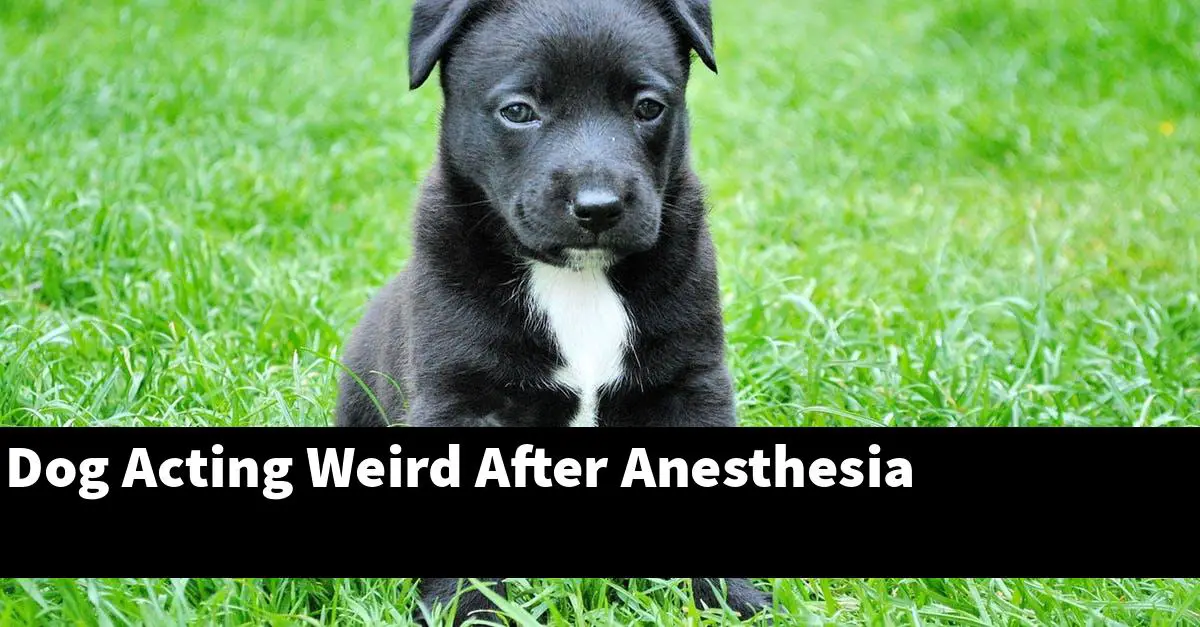There are a number of reasons why a dog may act weird after anesthesia. The most common reason is that the dog is experiencing side effects from the anesthesia. Side effects can include dizziness, confusion, and disorientation. Another possibility is that the anesthesia has caused the dog to experience an allergic reaction.
Many dog owners report their dogs acting weird after anesthesia. The most common behavior changes include increased thirst, increased urination, and changes in appetite. Other behavior changes may include increased activity levels, changes in sleep patterns, and increased vocalization.
Table of Contents
Why might a dog act weird after anesthesia?
When a dog is put under anesthesia, they are given a drug that relaxes their muscles and puts them into a deep sleep. This can cause some weird side effects, like trembling, drooling, and urinating on themselves. Some dogs may even act like they’re drunk when they first wake up. This is because the anesthesia can affect their coordination and balance. It usually takes a few hours for the effects of the anesthesia to wear off completely.
What are some possible side effects of anesthesia in dogs?
Anesthesia in dogs can have a variety of potential side effects. These can range from mild effects, such as drowsiness, to more serious effects like low blood pressure or difficulty breathing. In most cases, side effects from anesthesia are mild and temporary. However, it is important to be aware of the potential risks before your dog undergoes any type of surgical procedure.
Some of the most common side effects of anesthesia in dogs include:
Drowsiness: This is the most common side effect of anesthesia in dogs. Most dogs will sleep for several hours after surgery and may not be fully awake for 12-24 hours.
Low blood pressure: Anesthesia can cause a drop in blood pressure, which can be dangerous for some dogs. This is usually monitored during surgery and treated if necessary.
Difficulty breathing: Anesthesia can also cause respiratory depression, which means that the dog may have trouble breathing on their own. This is usually monitored during surgery and treated if necessary.
Vomiting: Vomiting is a common side effect of anesthesia, especially if the dog has an empty stomach. It is important to keep your dog’s stomach empty for at least 8 hours before surgery to minimize the risk of vomiting.
Diarrhea: Diarrhea is another common side effect of anesthesia. This is usually not a serious problem, but can be messy.
Urinary incontinence: Some dogs may experience urinary incontinence after surgery. This is usually not a serious problem and will resolve on its own.
These are just some of the potential side effects of anesthesia in dogs. Be sure to talk to your veterinarian about any concerns you have before your dog undergoes surgery.
How can you tell if a dog is experiencing problems after anesthesia?
The anesthesia process can be very different for each individual dog. Different breeds of dogs metabolize drugs differently, and each dog’s individual physiology can play a role in how they react to anesthesia. Because of this, it is important to closely monitor your dog after they have anesthesia so that you can identify any potential problems early on.
There are a few key things to look for when checking on your dog after anesthesia. First, make sure that they are breathing regularly and that their gums are pink in color. If their gums are pale or blue, this could indicate that they are not getting enough oxygen and you should contact your veterinarian immediately.
Another important thing to monitor is your dog’s body temperature. After anesthesia, your dog’s body temperature may drop below normal. A rectal temperature of less than 100 degrees Fahrenheit is considered abnormal and warrants a call to the vet.
finally, keep an eye on your dog’s level of consciousness. They may be drowsy and disoriented after anesthesia, but should eventually return to their normal state. If your dog seems excessively lethargic or is unresponsive to your voice or touch, this could indicate a problem and you should contact your veterinarian right away.
What should you do if your dog is acting weird after anesthesia?
If your dog is acting weird after anesthesia, it is important to contact your veterinarian. While it is not uncommon for dogs to experience some side effects after anesthesia, such as vomiting or lethargy, any behavior that is out of the ordinary should be evaluated by a professional.
There are a number of potential causes of abnormal behavior after anesthesia, including pain, infection, and adverse reactions to the medications used. Your veterinarian will be able to determine the cause of your dog’s symptoms and provide the appropriate treatment.
Why is my dog acting weird after being under anesthesia?
When a dog is put under anesthesia, it can act weird afterwards because it is disoriented and confused. The anesthesia can also cause vomiting and dizziness. If your dog is acting weird after being put under anesthesia, it is important to take it to the vet so they can check it out and make sure everything is okay.
What are the side effects of anesthesia in dogs?
Anesthesia always involves some risk, even when performed by a skilled veterinary anesthesiologist. The side effects of anesthesia in dogs can include:
1) Respiratory depression – this is the most common and potentially serious side effect of anesthesia in dogs. It occurs when the animal’s respiration slows or stops altogether. Animals can become hypoxic (lack oxygen in the blood) very quickly, and this can lead to organ damage or even death.
2) Cardiac arrhythmias – abnormal heart rhythms can occur during or after anesthesia. These can be benign and self-limiting, or they can be life-threatening.
3) Vomiting and aspiration – vomiting is a common side effect of anesthesia, especially in dogs. If the animal vomits and then inhales the vomit (called aspiration), this can lead to aspiration pneumonia, which can be very serious.
4) Muscle tremors – some animals may experience muscle tremors after anesthesia. These are usually not harmful, but can be disturbing to owners.
5) Excessive bleeding – sometimes, animals may bleed more than expected during or after surgery. This can be due to an underlying medical condition, or it may be a reaction to the anesthesia.
6) Allergic reactions – a small number of animals may have an allergic reaction to the drugs used during anesthesia. This can range from mild to life-threatening.
Overall, the side effects of anesthesia in dogs are usually relatively mild and self-limiting. However, serious complications can occur, and it is important to have your animal seen by a veterinarian as soon as possible if any problems arise.
How long does it take a dog to recover from Anaesthetic?
The recovery time for a dog after anaesthesia will vary depending on the type of anaesthesia used, the dog’s age and health, and the length of the procedure. Generally, most dogs will recover within 24 hours. However, some may experience side effects such as vomiting, diarrhoea, and loss of appetite. If your dog is experiencing any of these side effects, please contact your veterinarian.
Summary
– Dogs may act weird after anesthesia because of side effects like dizziness, confusion, and disorientation. Another possibility is that the anesthesia has caused the dog to experience an allergic reaction.


